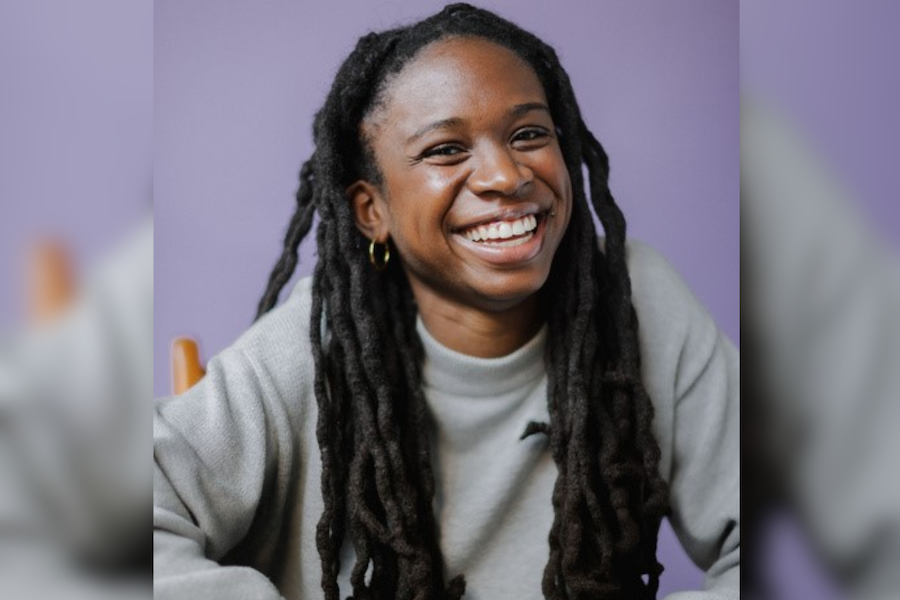Faith Arkorful’s debut book, The Seventh Town of Ghosts, was initially a distraction. The poetry collection is a seven-year labour of love, which was eventually brought to life because she was trying to avoid writing a novel. But poetry has long been a companion of Arkorful. It blossomed from a private hobby to an art she shared with fellow poets and enthusiastic audiences. One of her earliest readings was at the launch of the University of Toronto’s publication, Hart House Review in 2017. From becoming a regular at community poetry readings in Toronto, to meeting writing inspiration Canisia Lubrin (who would become her book editor), Arkorful created a poetry collection that embraces the city’s vibrancy and mourns the violence it causes Black people. She describes poetry as a way to investigate experiences and emotions. Her collection invites readers to visit “towns” where she grapples with existence, romanticizing life, the partners who introduced her to love, her role in her family and mourning those who left too soon.
As a CBC Poetry Prize finalist, 92NY Discovery Poetry Prize semi-finalist and National Magazine Award honouree, Arkorful is just getting started. The Seventh Town of Ghosts debuts on March 26. Broadview spoke to Arkorful ahead of her release.
SHERLYN ASSAM: What is it like to explore your poetry when you’re both caged into writing about being a Black woman and being inspired by the experience of a Black woman?
FAITH ARKORFUL: There is always that pressure to be boxed in or expected to write certain poems about certain content as a Black woman. Navigating that has always been difficult on some level. A lot of the love poems I write, when I’ve submitted them for publications in the past; those poems aren’t necessarily the ones that a lot of the literary community or publishers want to read. There’s oftentimes this expectation that as a Black writer, you are to speak specifically about the Black experience – what is that? Black people are so varied. Black people are so dynamic. And we have a multitude of experiences and things that we all have gone through. Obviously, there are some things that are similar. Dealing with anti-Black racism, that’s something I talked about in my book extensively and the relationship with the police. These are the things that again, are common to the Black experience or the Black Canadian experience. But even still – you do get pigeonholed. But you just try to move on. I’m gonna write what I want to write and no one’s gonna stop me. I think that persistence is something that has helped me.
More on Broadview:
- Black women are still struggling to get promotions and equal pay for their work
- New police drama ‘Allegiance’ explores how injustice can make you rethink your identity
- Joy Kogawa calls new poetry book her ‘last hurrah’ at 88
SA: What’s it like writing about a city and country you love that doesn’t love you back?
FA: I think of neighbourhoods like little Jamaica. Just the mass amount of gentrification and the lack of things the city has done to maintain and preserve that neighbourhood – that historically Black neighbourhood. There are fundamental problems in Toronto with anti-Blackness. There are fundamental problems with the way that police treat Black people in this city. I didn’t find it difficult writing about a city that I love and also a city that I think has some serious problems. I just thought it was my duty to speak to that truth because it’s the truth. It’s not even that I thought it would be right or wrong – that is my experience. That’s what I’ve seen. I had to speak to both. I felt like that was the most true.
SA: What’s the significance of the title, The Seventh Town of Ghosts?
FA: It is taken from the title of a chapter in Amos Tutola’s book, My Life in the Bush of Ghosts, about a child that goes on an adventure, basically in a middle world. It’s not quite like Earth and it’s not quite hell. There are a lot of fantastical creatures, and he’s fighting to navigate and move through this world that has many different towns to find his way back home. That theme of moving through different towns to find your way back to something really resonated with me. When I was reading the book and that title popped up, it just started the gears in my brain. As I started to write my book and collect the different ways the book was going to be structured, going through this journey from [a place of] heaviness to a place of love and celebration just lent itself to that journey.
This interview has been edited for length and clarity.
***
Sherlyn Assam is Broadview’s assistant digital editor.















